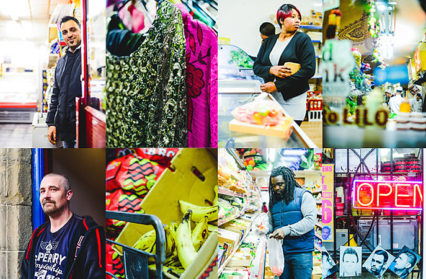Lewis Davies reviews the latest verbatim project Love, Cardiff: City Road Stories by Andrew Sterry about actual people in society.
“We call it Arabic Street. We don’t call it City Road,” announces Issa Farfour to wry laughter from a Saturday night theatre audience at the Sherman, Senghenydd Road, Cardiff. The theatre is four streets away from the subject of its latest verbatim project Love, Cardiff: City Road Stories. The distance is important, this is local theatre, the mixed cast of shop-keepers and actors, musicians, gardeners, pupils and poets: all live or work or socialise on the eponymous road. The performance is a twisting, engaging, narrative of unconnected stories that live and breathe, tied but also free from City Road.
City Road is one of those places that most people who have spent anytime living in Cardiff will know, have a story about: do you remember the night when… in that restaurant… when she lit the… in the the one that used to be next to the car showroom… which is now a Turkish bar with hookahs or the Tesco Metro or that new hairdressers. It is a place on the edge of other places. It’s not really Roath or Cathays but somewhere in between, undefined. As Peter Finch has claimed in this Real Cardiff series, City Road is a liminal place, edgy…. edging. City Road is always changing, redressing itself in the colours of change.
In this performance the changes over forty years of lived experience are given scope, the old dance halls and men only drinking clubs, the car showrooms and hairdressers.The more immediate focus is provided by the new immigrants that City Road offers a refuge of shared experience and a chance to hear their own language: the Syrian living with is brothers, the family from Pakistan awaiting a visa. And there’s the vibrant, hopeful commerce: Janet Symmons has opened a shop that doubles as a community centre for African immigrants while Faith Attwell has opened a shop selling lingerie, “salt and pepper for your sex-life, you can’t sell happiness but you can sell vibrators.” It’s that type of road. Set-up shop, there’s a space for it. Cook, eat it, sell-it. A fair bit of the focus is about the shared experience of the city, a gardening project acts as a metaphor for community building, growing and the sharing food is always important.
The project is a reminder of how community actually works, Raymond Williams who wrote about the interdependence of people and place in his 1960 novel Border Country, would be familiar with the culture and society portrayed here. Thaer Al-Shayel’s well crafted monologues of childhood are firmly grounded in the nature of place.
The stories of Cardiff are often lost between the cracks in the pavements of the city. Leonora Brito’s short sharp tales of the Docks in the sixties and seventies have slipped from view, lloyd robson, a poet and photographer was developing a City Road project in the 90s which was captured in parts through the raw energy of his largely forgotten novel, Cardiff Cut. Peter Finch has spent several decades scouring the city for stories to people his Real Cardiff series. Finch himself appears in this piece as one of the storytellers displaying some excellent comic timing to add to his reportage skills.
As a play about actual people in society this is a successful production and a good Saturday night out in the theatre. Director and writer Andrew Sterry’s production, with echoes of Peter Gill’s National Theatre interpretation of Cardiff East, marshals a committed and engaging cast, to put himself firmly into the tradition of Cardiff storytelling.












